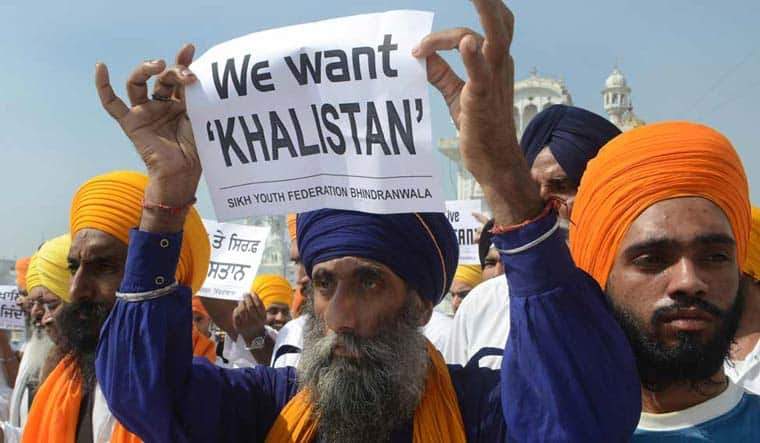Report reminds Europe to be wary of re-emergence of Khalistani militant groups

Canada’s leading think-tank, the Macdonald Laurier Institute, has just published a major new report entitled Khalistan: A project of Pakistan. For the first time, it acknowledged that the Khalistani separatist movement, based in Canada, is a ‘geopolitical project’ of Pakistan which not only threatens the security of India but of Canada as well, writes Martin Banks.
The report comes almost 35 years since the bombing of Air India Flight 182, commonly known as the ‘Kanishka Bombing’ by a Khalistani militant organisation.
Amid a possible fundamental shift in Canada’s Khalistan policy, the key question now is whether there are lessons from Canada that Europe can learn to avert such a threat.
For a long time, the world refused to accept the invisible hands of a malevolent ‘state’ pulling the strings, “from behind the curtain”, in orchestrating and fanning the proliferation of both Kashmiri and Khalistani separatist movements.
However, there are signs now of a renewed push by Pakistan to whip up the Khalistani separatist movement issue by using Europe’s ultra-liberal ecosystem as its breeding ground. It means time is running out for Europe to act.
The fact that the first Khalistani flag was raised in Birmingham way back in 1970s shows how long Europe has been centre stage of the separatist movement. While the movement lost much of its momentum over the ensuing decades after a violent spate of militant activities in India by Pakistan-backed Khalistani militant groups, it has been given a fresh impetus over the last few years. This, it is argued, is funded and fuelled by Pakistan’s intelligence service, the ISI, and has triggered a renewed militant separatist mind set among the Sikh diaspora youth.
This should be of real concern for Europe.
In July this year, the Union Home Ministry of Government of India published a list of nine individuals designated as Khalistani terrorists who are accused of spreading terrorism in India from overseas. Two of these are based in Germany and one in the UK. Over the years, there have been plenty of indications of Pakistan using the Khalistani separatist organisations to ferment anti-India protests in key parts of Europe. For example on August 15, 2019, while a section of the Indian diaspora was peacefully celebrating India’s Independence Day outside the Indian High Commission in London, they were violently confronted by a group of British Pakistanis and members of Khalistani separatist organisations. London Mayor Sadiq Khan was criticised online for a perceived lack of security arrangements that led to Indian diaspora being abused.
It is also alleged that two UK based Sikh organisations (Sikh Network and Sikh Federation) have sympathies towards the Khalistani issue.
European countries,and especially the likes of UK, need to take a cue from the report by the Macdonald Laurier Institute and Canada’s bitterly learnt lessons on supporting the Khalistani movement.
To add to such concerns,Sikh separatist activities in the UK appear to be getting support from British politicians.
Take for example, a reported tweet of August 12, 2018 by Nazir Ahmed, a member of UK’s House of Lords and originally hailing from Mirpur, Pakistan. In the tweet he reportedly conveyed his support for the Khalistan movement.
There is evidence that Pakistan-backed Khalistani militant groups are on the rise in Italy too.
Over the years, Pakistan’s alleged funding of Islamist terrorism in Kashmir and elsewhere in India has failed to trigger any substantial return. Instead, it has only helped spark a proliferation of nationalistic fervour in India and increase global pressure on Pakistan for harbouring Islamist terrorism.
This has perhaps why Pakistan now seems to be changing gears and whipping up the Khalistani separatist issue once again by fermenting a new wave of unrest and militancy in India.
Interestingly, the map of Khalistani organisations allegedly backed by ISI deliberately does not include Pakistan’s Punjab region even though the original Sikh kingdom had West Punjab as a critical stronghold and hub of its administration.
This could be seen as a sign of how both Pakistan and Khalistani organisations have reached an agreement on not infringing on the territorial integrity of Pakistan in return of Pakistan’s support for the movement.
The silence of Khalistani organisations on this issue is staggering. Or, is it just a small price for them to pay in lieu of ISI’s institutional backing for the movement?
The bigger issue at stake is whether major European nations currently understand the gravity of what is going on.
EU member states would do well to grasp the changing dimensions of ‘hybrid warfare’ and where exactly a line should be drawn between ‘freedom of expression’ and ‘dissent.’
Referendum 2020 on whether Punjab should become an independent country is a test-case for EU countries as to whether they have matured as democratic liberal nations – or just reduced to “breeding grounds” for separatist movements from across the world.
The 1985 tragedy of Air India Flight 182, which killed 329 people – still the worst terrorist attack in Canadian history – should act a stark reminder to Europe that, like ISIS fighters returning from Syria, they may be harbouring “another Frankenstein” in their backyard.
Photo and Link: https://newsakmi.com/news/world/europe-news/report-reminds-europe-to-be-wary-of-re-emergence-of-khalistani-militant-groups/











